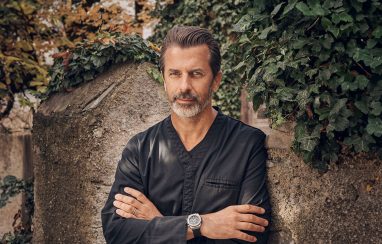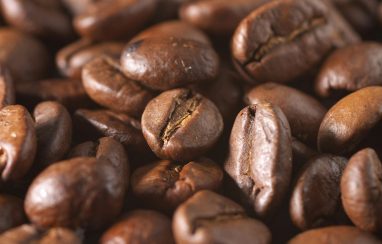By Paulina Björk Kapsalis
“Real luxury is a zucchini flower that never sees the fridge,” says Bertrand Valegeas. How that zucchini flower is prepared depends on what else is in his garden – or perhaps what the cheesemaker delivered earlier that day. Since taking on the responsibility of overseeing the restaurant kitchens at Mandarin Oriental, Costa Navarino, the French chef has dedicated himself to transforming local ingredients into meals that guests will remember forever.
Since proudly opening its doors for its highly anticipated third season on April 10, the resort has continued to set new standards in luxury hospitality and gastronomy across all of its restaurants. Valegeas curates menus that span authentic Greek flavors at Oliviera, light and healthy Levantine dishes at Tahir, refined French cuisine at Brasserie de la Bay, leisurely seaside lunches at Ormos Beach Club, a spectacular omakase pizza degustation at Pizza Sapienza, and exclusive, bespoke meals at The Private Kitchen. Notably, both Pizza Sapienza and The Private Kitchen were recently honored at the Toques d’Or (Golden Cap) Awards, recognizing Greece’s top restaurants.
We caught up with Chef Valegeas last month in Paris, where he was “on tour” with Oliviera for Oliviera Unveiled – a global event series celebrating authentic Greek cuisine.
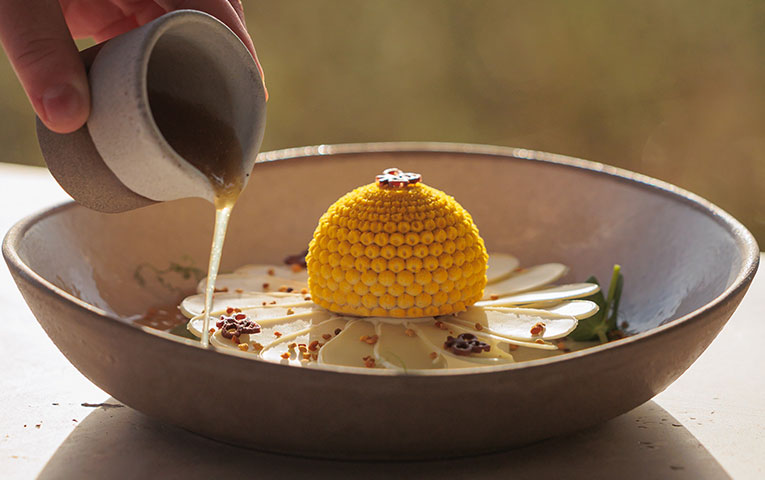
First of all, congratulations on earning two awards! How does it feel to get this type of recognition?
Thank you! It’s a great achievement for the team and a testament to their hard work. Especially for us, as we’re only going into our second full season – it’s wonderful to receive this recognition so early on. I think there’s still much more to come. I have a long history with the Toques d’Or (Golden Cap) Awards and was once named their Chef of the Year.
You grew up and got your start in France. Is it true that Paris makes the world’s best chefs?
No. Even Parisian chefs aren’t from Paris – they come from the countryside. I believe that to be a great chef, you need to have a strong connection to a terroir and develop your cooking style from that foundation. Your roots matter, whether they’re in France, Greece, or Northern Europe. Being in Paris can help your career because if you do well, you’ll be busy – but cuisine should always be inspired by where we come from and our personal travels.
You’ve also spent years working in Singapore and Dubai. How have these places influenced you?
I think we must stay curious, to look around us and learn every day. Every place inspires me in different ways. When you’re in the Middle East, for example, the culture is completely different from what we’re used to in Europe. When I was in Singapore that was an opportunity to explore Asia, so I traveled all over. I visited Vietnam, Laos, Hong Kong, Japan, and even Australia. I immersed myself in their cultures, flavors, herbs, and spices. That’s what makes this job magical.
Are you a traveler at heart?
Yes, I love traveling. Next year, I hope to visit Peru and Chile…
And Oliviera gained wings this winter. Tell me about Oliviera Unveiled.
Yes! Oliviera Unveiled is all about discovery – both for us and for our guests. We want to show people what Greek food is really about. Greek cuisine is trending right now, but many Greek restaurants around the world aren’t truly authentic or traditional.
At the same time, as we travel, our team is taking the opportunity to explore new cultures and ingredients. We were in Madrid, and then in Miami for three weeks. It was our first time in Miami, so we experienced Cuban and Peruvian food. Whether it’s ceviche or a beautiful Cuban sandwich, these experiences open our eyes to new products and possibilities. It would be a shame if it were a one-sided journey – where we only share what we know and don’t take lessons home with us.
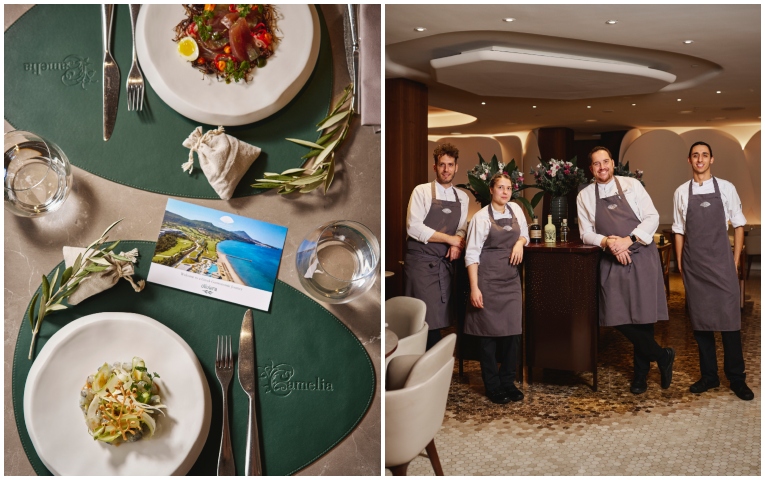
What are your aspirations in your role as Executive Chef?
To always be better than yesterday. In many ways, being a chef is like being an actor – every night, you have a new audience, and you have to perform at your best. It’s not easy because our ingredients change daily. Our vegetables will be different, our fish will vary in size, the weather will shift. We must constantly adapt while ensuring every dish is the best it can be. That’s the most challenging – and the most exciting – part of the job.
What are the most important things you want people to know about Messinian food?
That we have beautiful produce, wonderful farms, and great cheesemakers and fishermen. For me, having unlimited access to these resources is a constant source of inspiration. When the fisherman arrives at our jetty with the day’s catch, guests are often amazed. The same thing happens when the cheesemaker comes with his feta, sfela, and graviera. When I’m creating a dish, I can speak directly with these producers. I can say, “I need a graviera like this,” and the cheesemaker will take me to the cave where he ages them, showing me special wheels that might be perfect for my dish. I think and I hope that this region will stay unspoiled. We’re not Mykonos. This is a pristine place with extraordinary products and passionate people.
It’s interesting – while you say a chef’s roots are important, you’ve worked in vastly different places and seem to honor the heritage of the region above all.
Exactly. Our philosophy at Costa Navarino is that when guests arrive, it’s our responsibility to show them what Greece, Messinia, and philoxenia are all about. That’s one of the reasons I love Mandarin Oriental as a company – we honor the roots. What I do at Costa Navarino wouldn’t be the same as what I’d do in a kitchen in Paris or New York.
After living in Greece for so many years, do you feel like it’s home?
Yes, Greece is my home now. I was just talking about this with [French-Greek journalist] Nikos Aliagas, who visited me here in Paris. I told him this is the first time I’ve been in France and felt like a tourist!
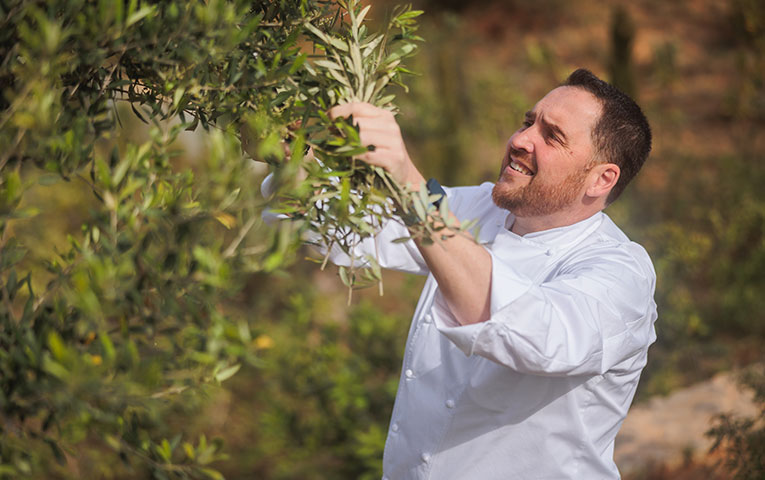
How do you go about preparing international cuisines with local ingredients?
That’s easy when you have high-quality ingredients that are naturally similar. For our international offerings, we have our pizza restaurant, Pizza Sapienza, and our Levantine restaurant, Tahir – both of which use ingredients that closely align with what we have here.
For the pizza, the only ingredient we import is the flour, which comes from a small farm in Italy. Everything else comes from our garden, a nearby farm we collaborate with, and local producers. For the Lebanese, Syrian, Jordanian, Israeli, and Turkish dishes at Tahir, it’s mostly about using the right spices to complement our local ingredients – and putting them in the hands of our Syrian chef.
But we can’t cook every cuisine! If you ask me for mango, I’ll say “Sorry, if you want mango, go to the tropics.” Here, we’re lucky enough to have beautiful watermelons, apricots and peaches. We only serve what’s local and in season. I love Mexican food and Indian food, but I don’t have the right ingredients or the right people to do it justice – so I simply won’t do it. It’s very important to me that we only serve food that’s 100% at its best.
Besides working with local producers, you also grow some of your own ingredients. What’s in your garden?
I’m lucky enough to have a big, big beautiful chef’s garden – it’s the first thing you see when you arrive at the resort. We grow around 15 varieties of tomatoes, fantastic zucchini, and a wide range of herbs. I can take guests harvesting with me, letting them discover different types of mint and basil. Having this garden is a real luxury for me, especially when I’m cooking for the Private Kitchen.
Tell me about the Private Kitchen.
The Private Kitchen is my baby! It’s a 16-seat restaurant where we create an intimate, front-row culinary experience. Dining there is a direct interaction with the chef, and the food reflects me – my 35-year career, my life, my inspirations, and my garden.
A real luxury for me is going into the garden and picking a zucchini flower that will never see the fridge. An hour later the guest is eating it – still fluffy, with the right color and texture.
Even when I prepare my signature dishes, which I’ve been making for decades, I adapt them based on the best ingredients available that day. Sometimes, I don’t even know what the menu will be until a couple of hours before service.
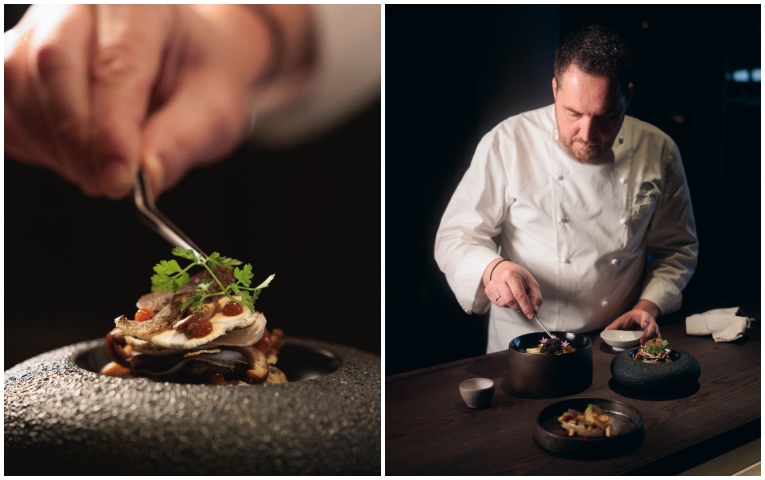
Costa Navarino is working to eliminate all single-use plastics at the destination. How can we turn kitchens into plastic-free environments?
Mandarin Oriental has already eliminated single-use plastics entirely – everything from cling film to vacuum bags. But it’s definitely not easy, especially in Greece.
We’re working toward zero waste in a country that isn’t yet fully set up for it. But beyond eliminating plastics, there are other steps we can take. For instance, we don’t serve buffets because they generate food waste. Instead, we use the “paramana” concept – a large tray of dishes brought to the table for guests to choose from, just like in many traditional Greek tavernas. The selection changes daily, and at breakfast, we offer two trays: one savory and one sweet.
In the kitchen, we also find creative ways to minimize waste. We dry vegetable trimmings and grind them into a powder and use this spice on our burger buns instead of sesame seeds. Any leftover food from guests’ plates goes straight into our compost, which nourishes the garden.
I love Greek cuisine, but I have to say – the pizza degustation menu at Pizza Sapienza sounds like a dream come true. Tell me about it!
It’s an amazing concept. The experience begins with the view as you arrive at the pizza bar at sunset. We serve an omakase menu of six different pizzas, making it a truly unique experience.
There are only two pizza bars like this in the world. The first is Pizza Sapienza by Daniele Cason at the Mandarin Oriental in Tokyo, which consistently ranks among the best pizza restaurants globally. Even the flour from the Italian farm is produced only for us and the pizza bar in Tokyo – so it’s something very special.

Talking about special dining experiences – Tell me about your “Starry Nights” events.
The Starry Nights are a series of very exclusive events, the kind of which happen very rarely in Greece. Once or twice per month, we invite 2-or-3-Michelin-starred international chefs, pastry chefs, and big names in the wine field to create four- or six-hands dinners with me in The Private Kitchen. This year, all of the chefs are international – most of them French.
To give you an idea, guests will experience the flavors from important chefs like Andreas Caminada, Julien Royer and Pascal Barbot; and the pastry chef of the Hôtel Lutetia in Paris, Nicolas Guercio, with whom we will present traditional pastries with a savory touch. I’ve met with some of them while here in Paris, and the menus we created are very, very nice.
As for all meals in The Private Kitchen, there are only 16 seats, and each event is only for one or two evenings – so they’re incredibly unique opportunities to sample the work of these amazing chefs in a beautiful environment.
Tell me about the other dining options at the Mandarin.
We have Brasserie de la Bay, overlooking the golf greens, where we serve classic Parisian brasserie dishes. There’s Ormos Beach Club for relaxed, seaside or poolside lunches. And then there’s the Three Admirals Lounge – our bar with what I believe is the most breathtaking sunset view in Messinia, if not all of Greece.
I couldn’t possibly choose a favorite among them – it would be like picking a favorite child!
Let’s end with another tough one. You have to choose: Butter or Messinian extra virgin olive oil?
Both! In The Private Kitchen, we actually blend them. We create a spread that has the texture of butter but the flavor of olive oil – so I don’t have to choose!
I mean, on the one hand, I can walk into the garden, pick a sun-ripened tomato straight from the vine, slice it in half, drizzle it with our own extra virgin olive oil, sprinkle it with salt, and eat it – simple and perfect. But on the other hand, there’s nothing like a piece of sourdough bread, fresh from the oven, with a bit of salted butter – especially a traditional Beurre de Baratte.
At the end of the day, I’m French. We’re epicurean – we love to eat and drink well, and live for the moment.
